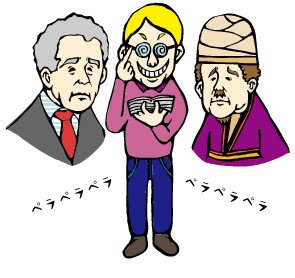Here's a site that is making some great videos in plain English to explain Web 2.0 technology. It's also good for intermediate English speakers to listen to and follow the script. Take a look at it here with the script and you can find other interesting videos at
.
These four friends are going on a camping trip. They need to bring the right supplies because they're backpacking.
The group needs to plan and plan well, so coordination is key.
They're all computer users, so they start planning with an email.
It's start with one, but then becomes a barrage.
Email is not good at coordinating and organizing a group's input.
This is the old way - Booo!
The important information is scattered across everyone's inbox.
This isn't coordination!
Let's start over.
There is a better way.
It requires using a website called a wiki.
Using a wiki, the group can coordinate their trip better.
This is the new way - Yaay!
Most wikis work the same.
They make it easy for everyone to change what appears on a webpage with a click of a button.
It's as easy as erasing a word and rewriting it.
The buttons are really important.
There are two that are essential.
They are "edit" and "save", and they are always used together.
Let's see them in action.
Here are our camping friends and here is a wiki website.
Like all wikis, it has an edit button.
Clicking this button, transforms the webpage into a document.
All you have to do is click it and the webpage becomes a document ready for editing.
Editing the page means you can add or remove words or change how they look, just like writing a letter.
Once you're finished editing, you click "save" and the document becomes a webpage once again, and is ready for the next person to edit it - easy!
Edit - Write - and Save.
Using this process, a group can coordinate more easily.
Let's apply this to our camping friends, who need to bring the right supplies.
Mary signs up for a wiki site and then sees the new site for the first time.
She clicks the edit button to get started.
She creates two lists for camping: What we have and what we need.
Under "we have" she lists the things she will bring: A cooler, stove and flashlight.
Under "we need" she lists items that others need to bring: compass, lighter, water, and food.
She finished the process by clicking save and the website now has lists for the camping trip.
Now it's John's turn.
John visits the wiki website, clicks edit and the page becomes a document ready for him to make changes.
John volunteers to bring food and water, so he moves those to the have column.
He also realizes the group will need a knife and rope.
Once he's finished, he clicks "save" and the wiki is ready for the next person.
Henry visits the wiki, clicks "edit" and he can edit the page.
He remembers they need a tent.
Henry saves the page and the wiki is ready for Frank.
Frank edits the page and agrees to bring the remaining items, completing the process.
Frank saves the page and realizes something awesome.
The group has created the perfect camping list - without email - yaay!
But wait! One thing is missing.
They need a location for the campsite.
The wiki can help with this too, but another page is needed.
John visits the wiki and clicks edit to edit the page.
He types in the word "locations" and highlights it.
He thens clicks the "link" button.
This changes the word "locations" into a link to a new page.
John clicks "save" and next, Frank visits the wiki and sees the lists and the link to the new page.
He clicks on the "locations" link and arrives at the new page.
This new page enables the group to use the same "Edit, Write, Save" process to coordinate locations.
This process can be repeated over and over.
These three buttons, edit, save, and link make it possible to organize a great camping trip or create the world's biggest encyclopedia.
You can sign up for your own wiki at these websites: pbwiki, wetpaint, or wikispaces.
I'm Lee LeFever and this has been Wikis in Plain English on the Common Craft Show.





